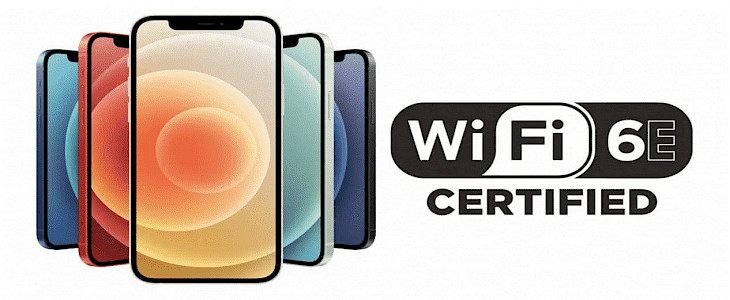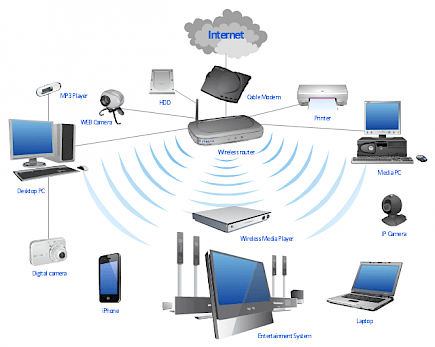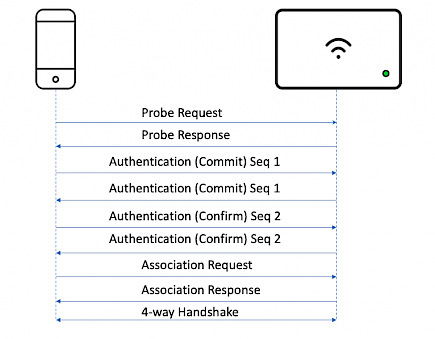
So, you have a lot of work and want a phone which could give you the fastest internet connectivity. As of 2021, there are a lot of great smartphones out there which not only boast great connectivity over cellular networks but also have great overalls.
But, if we are talking about smartphones, How can we forget the iPhone? Yes, it's pricey and not the best one out there but, Apple is going to release the new iPhone 13 with software that is going to support the new Wi-Fi 6E. An extended version of Wi-Fi 6.
According to trusted sources, This network is the band ranging from 5.925 GHz to 7.125 GHz, allowing up to 1200 MHz of additional spectrum. And on paper, access to the 6 GHz frequency brings more bandwidth, faster speeds, and lower latency, opening up resources for future innovation like AR/VR, 8K streaming, and more.
So, what are we waiting for? Let’s learn more about it.
1) How is it different from WiFi 6:
Your question might be: How does it help me? 1200MHz, 5.925 GHz, etc are just technical terms. What does it mean to me?
In layman terms, Suppose you live in an area where there are hundreds of Wi-Fi connections, but when all of them work in the same frequency spectrum, they are essentially competing with each other. Thus giving you a slower speed. Your network provider might be providing you with the best internet, but this congestion slows down your network.
So, with additional frequency bands comes additional speed.
2) What is the need for WiFi 6E?
With WiFi 6E, you can get a faster data speed. But, the most important thing is the WiFi network would be free of any unwanted congestion, and you will not see any connectivity dropping in your device due to the network.
This thought of working without any hamper is just bliss, right?
Do I need other devices to reap the benefits of Wifi-6E?
Certainly, you would need a new Wi-Fi router also PCs, and Smartphones which support Wi-Fi 6E like iPhone 13.
Click "here", to get the best deals on Wi-Fi Routers.
3) Will it improve my Wi-Fi speed?
If we think about it in terms of number, then...
No, both the Wi-Fi 5Ghz and 6 and 6E have the maximum speed limit of 9.6 Gbps which is way more than what network providers provide. But we must understand that speed is actually not a problem that newer standards of Wi-Fi are trying to solve, but it’s the network congestion that hampers good network speeds.
As the population is growing, so does the number of internet users. There were approximately 4.66 billion active internet users worldwide in January 2021. Accounting for 59.5 percent of the global population. 92.6 %(4.32 billion) of this total used mobile devices to access the internet.
Thus, such a huge number of internet users creates congestion that is something we have to tackle if we want to reach that upper-speed limit of Wi-Fi standards at an affordable price.

So, these new proposed standards are more focused on giving more frequency, more bandwidth to solve that problem.
4) Will I experience any difference if I upgrade?
There is not a straightforward answer to this reality; it depends on your priorities and the area around you. Yes, if network congestion is really a problem in your area, which is generally true in larger cities, but in small cities, you would experience a slight difference.
We have to talk about coverage of these networks too. With newer Wi-Fi standards, the range is actually decreasing. Because unlike older generation 2.4Ghz bands, we are using higher bands that can’t penetrate through solid walls or solid objects. Thus we may find good speed but lower ranges.
So if the range is a priority for you and you can only afford a single router, routers with older support bands. But certainly in the future, with the expanding sphere of technology, we would be able to figure out a new technology which can support range and speeds both at the same time with minimal to no network congestion.
Let’s see what the future has to offer.
5) What are the new security measures that are taken?
Security with the internet is something that needs to be kept a close eye on. With the new Wi-Fi standards, the security burden (WPA3 protocol) is something that the routers will now have to manage.
You don’t need to have strong passwords to safeguard yourself, although we recommend having a good password that can’t be easily guessed. But nevertheless, with newer standards of Wi-Fi, newer standards of security are also coming to the market for the consumers.

6) Wi-Fi 6/6E? Is it available all around the world?
Unfortunately, the answer to this question is no. Wifi 6/6E is awaiting confirmation from the regulatory bodies of the respective countries around the world.
So far, only a few countries, namely the USA, UAE, and a few countries in Europe, have actually reserved these frequency bands for Wi-Fi use. However, more and more countries are trying to be a part of it.
No one wants to lag behind. So you may expect your country to also do the same in a period of 1-2 years.
7) Should you upgrade your routers as soon as it hits the market?
Probably yes, if you are a tech geek and aren't afraid of spending too much you should consider upgrading your router/ routers.
But speaking frankly, we would recommend waiting and observing. Is it really that good? Or is it just hype? Also if you wait a little bit, the prices will also come down, and it will become a little bit more affordable. Also, you can expect to get a much better price to feature ratio if you wait a bit.
8) Will, your older devices do not work anymore?
No, your older devices will work just fine; they will not be kept in museums after the new standards hit the market. Because all routers which will support the newer versions will also support the older versions too. And you don’t need to worry about it. So sit back and enjoy the revolution around you. Don’t get too panicky.
9) Apart from iPhone 13, what other devices will support these standards?
Wi-fi 6 and 6E will become a global standard for phones releasing from the next year onwards, be it be Apple devices or Android devices. No one wants to lag behind.
10) Wrapping Up
I hope you got to know a good dose of information about this new technology. Now you are a more informed consumer who can be safe from pointless hypes that these big tech companies are making to lure you into their product and pay you more.
If you love this article of ours, you would surely love other articles too; head over to our other articles and pen down whatever you feel like in the comments below. We really love your suggestions. Good Day!





